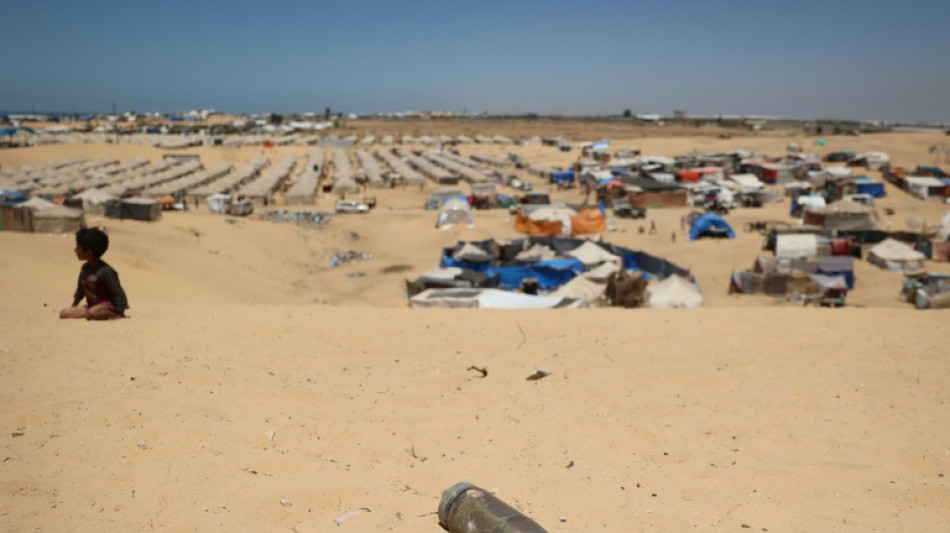
-
 Billionaire-owned Paris FC win promotion and prepare to take on PSG
Billionaire-owned Paris FC win promotion and prepare to take on PSG
-
Teenager Antonelli grabs pole for Miami sprint race

-
 Man City climb to third as De Bruyne sinks Wolves
Man City climb to third as De Bruyne sinks Wolves
-
Mercedes' Wolff backs Hamilton to come good with Ferrari

-
 'Devastated' Prince Harry says no UK return but seeks reconciliation
'Devastated' Prince Harry says no UK return but seeks reconciliation
-
Elway agent death likely accidental: report

-
 Turkish Cypriots protest new rule allowing hijab in school
Turkish Cypriots protest new rule allowing hijab in school
-
Germany's AfD dealt blow with right-wing extremist label

-
 Trump NASA budget prioritizes Moon, Mars missions over research
Trump NASA budget prioritizes Moon, Mars missions over research
-
Hard-right romps through UK polls slapping aside main parties

-
 Rangers hire two-time NHL champion Sullivan as coach
Rangers hire two-time NHL champion Sullivan as coach
-
Haaland on bench for Man City as striker returns ahead of schedule

-
 US designates two Haitian gangs as terror groups
US designates two Haitian gangs as terror groups
-
Lower profits at US oil giants amid fall in crude prices

-
 NBA icon Popovich stepping down as Spurs coach after 29 seasons
NBA icon Popovich stepping down as Spurs coach after 29 seasons
-
'Devastated' Prince Harry says no return to UK but seeks royal reconciliation

-
 Grande scratched from Kentucky Derby
Grande scratched from Kentucky Derby
-
Carney vows to transform Canada economy to withstand Trump

-
 Prince Harry says he would 'love' to reconcile with family
Prince Harry says he would 'love' to reconcile with family
-
Major offshore quake causes tsunami scare in Chile, Argentina
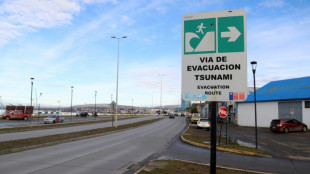
-
 GM cuts shift at Canada plant over 'evolving trade environment'
GM cuts shift at Canada plant over 'evolving trade environment'
-
F1 extends deal to keep Miami GP until 2041

-
 Popovich mixed toughness and spirit to make NBA history
Popovich mixed toughness and spirit to make NBA history
-
US asks judge to break up Google's ad tech business

-
 Trump eyes huge 'woke' cuts in budget blueprint
Trump eyes huge 'woke' cuts in budget blueprint
-
Ruud downs Cerundolo to book spot in Madrid Open final

-
 Gregg Popovich stepping down as San Antonio Spurs coach after 29 seasons: team
Gregg Popovich stepping down as San Antonio Spurs coach after 29 seasons: team
-
Guardiola to take break from football when he leaves Man City

-
 Vine escapes to Tour of Romandie 3rd stage win as Baudin keeps lead
Vine escapes to Tour of Romandie 3rd stage win as Baudin keeps lead
-
Olympic 100m medalist Kerley arrested, out of Miami Grand Slam meet

-
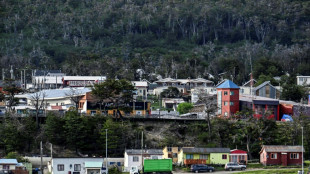 Chile, Argentina order evacuations over post-quake tsunami threat
Chile, Argentina order evacuations over post-quake tsunami threat
-
Arteta 'pain' as Arsenal fall short in Premier League title race

-
 Hard-right romps across UK local elections slapping down main parties
Hard-right romps across UK local elections slapping down main parties
-
US ends duty-free shipping loophole for low-cost goods from China

-
 Renewables sceptic Peter Dutton aims for Australian PM's job
Renewables sceptic Peter Dutton aims for Australian PM's job
-
Australians vote in election swayed by inflation, Trump

-
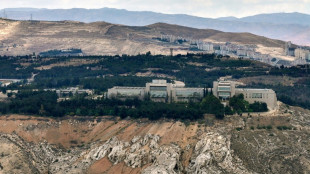 Syria slams Israeli Damascus strike as 'dangerous escalation'
Syria slams Israeli Damascus strike as 'dangerous escalation'
-
Grand Theft Auto VI release postponed to May 2026

-
 Lawyers probe 'dire' conditions for Meta content moderators in Ghana
Lawyers probe 'dire' conditions for Meta content moderators in Ghana
-
Maresca confident Chelsea can close gap to Liverpool

-
 Watchdog accuses papal contenders of ignoring sex abuse
Watchdog accuses papal contenders of ignoring sex abuse
-
Berlin culture official quits after funding cut backlash

-
 US hiring better than expected despite Trump uncertainty
US hiring better than expected despite Trump uncertainty
-
EU fine: TikTok's latest setback

-
 Stocks gain on US jobs data, tariff talks hopes
Stocks gain on US jobs data, tariff talks hopes
-
Barca's Ter Stegen to return from long lay-off for Valladolid trip

-
 US hiring slows less than expected, unemployment unchanged
US hiring slows less than expected, unemployment unchanged
-
Man Utd must 'take risk' and rotate players as they target European glory: Amorim

-
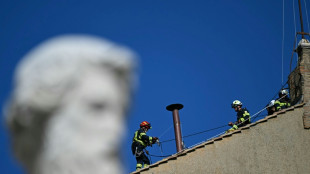 Vatican chimney installed ahead of papal conclave
Vatican chimney installed ahead of papal conclave
-
Toulouse's Ramos to miss Champions Cup semi with injury


Shiny and deadly, unexploded munitions a threat to Gaza children
War has left Gaza littered with unexploded bombs that will take years to clear, with children drawn to metal casings maimed or even killed when they try to pick them up, a demining expert said.
Nicholas Orr, a former UK military deminer, told AFP after a mission to the war-battered Palestinian territory that "we're losing two people a day to UXO (unexploded ordnance) at the moment."
According to Orr, most of the casualties are children out of school desperate for something to do, searching through the rubble of bombed-out buildings sometimes for lack of better playthings.
"They're bored, they're running around, they find something curious, they play with it, and that's the end," he said.
Among the victims was 15-year-old Ahmed Azzam, who lost his leg to an explosive left in the rubble as he returned to his home in the southern city of Rafah after months of displacement.
"We were inspecting the remains of our home and there was a suspicious object in the rubble," Azzam told AFP.
"I didn't know it was explosive, but suddenly it detonated," he said, causing "severe wounds to both my legs, which led to the amputation of one of them."
He was one of hundreds of thousands of Palestinians returning home during a truce that brought short-lived calm to Gaza after more than 15 months of war, before Israel resumed its bombardment and military operations last month.
For Azzam and other children, the return was marred by the dangers of leftover explosives.
- 'Attractive to kids' -
Demining expert Orr, who was in Gaza for charity Handicap International, said that while no one is safe from the threat posed by unexploded munitions, children are especially vulnerable.
Some ordnance is like "gold to look at, so they're quite attractive to kids", he said.
"You pick that up and that detonates. That's you and your family gone, and the rest of your building."
Another common scenario involved people back from displacement, said Orr, giving an example of "a father of a family who's moved back to his home to reclaim his life, and finds that there's UXO in his garden".
"So he tries to help himself and help his family by moving the UXO, and there's an accident."
With fighting ongoing and humanitarian access limited, little data is available, but in January the UN Mine Action Service said that "between five and 10 percent" of weapons fired into Gaza failed to detonate.
It could take 14 years to make the coastal territory safe from unexploded bombs, the UN agency said.
Alexandra Saieh, head of advocacy for Save The Children, said unexploded ordnance is a common sight in the Gaza Strip, where her charity operates.
"When our teams go on field they see UXOs all the time. Gaza is littered with them," she said.
- 'Numbers game' -
For children who lose limbs from blasts, "the situation is catastrophic", said Saieh, because "child amputees require specialised long-term care... that's just not available in Gaza".
In early March, just before the ceasefire collapsed, Israel blocked all aid from entering Gaza. That included prosthetics that could have helped avoid long-term mobility loss, Saieh said.
Unexploded ordnance comes in various forms, Orr said. In Gaza's north, where ground battles raged for months, there are things like "mortars, grenades, and a lot of bullets".
In Rafah, where air strikes were more intense than ground combat, "it's artillery projectiles, it's airdrop projectiles", which can often weigh dozens of kilograms, he added.
Orr said he was unable to obtain permission to conduct bomb disposal in Gaza, as Israeli aerial surveillance could have mistaken him for a militant attempting to repurpose unexploded ordnance into weapons.
He also said that while awareness-raising could help Gazans manage the threat, the message doesn't always travel fast enough.
"People see each other moving it and think, 'Oh, they've done it, I can get away with it,'" Orr said, warning that it was difficult for a layperson to know which bombs might still explode, insisting it was not worth the risk.
"You're just playing against the odds, it's a numbers game."
I.Stoeckli--VB

